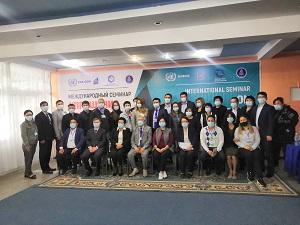Building regional capacity for devising and putting into practice trade facilitation policies is critical to strengthen trade as a driver of sustainable and resilient recovery.
UNECE teamed up with the Kyrgyz Economic University (KEU) to produce a professional development course on trade facilitation through the newly established Centre for Trade Facilitation within KEU. The goal is to make knowledge on trade facilitation including international best practices, standards, recommendations and local case studies accessible to all interested parties in the Kyrgyz Republic.
The first seminar organized by the Centre in collaboration with UNECE took place on 15-16 September 2021 in Issyk-Kul, Kyrgyz Republic. It was composed of two modules of the professional development course on:
- World Trade Organization Trade Facilitation Agreement (WTO TFA) and National Trade Facilitation Committees (NTFC); and
- Supply chain management.
Aiming to test the relevance of information collected and gauge the interest among participants, the seminar brought together representatives from five ministries, National Trade Facilitation Council, State Customs, Administration of President, Single Window Agency, as well as representatives of private sector in trade and research organizations and universities.
Participants shown profound interest in case studies and best practices both in the Kyrgyz Republic and abroad, which demonstrated the high demand for such a course. These two modules will form a larger professional development course on trade facilitation, which will be developed by April 2022, which will also include modules on facilitation of import and export trade procedures, implementation of single window, cross-border e-commerce and intra- and extra-regional cross-border trade.
The course will draw on the recommendations and standards of the United Nations Centre for Trade Facilitation and Electronic Business (UN/CEFACT) - a subsidiary, intergovernmental body of the United Nations Economic Commission for Europe. These recommendations and standards reflect best practices in trade procedures and data and documentary requirements and are used worldwide to simplify and harmonize international trade procedures and information flows.
KEU Rector Almaz Kadyraliev stressed that “the Centre for Trade Facilitation is the only training centre on this topic in the region. The Centre plans to train over 400 specialists in trade facilitation by 2025 from the Kyrgyz Republic and Central Asia, and to integrate the modules into the Bachelor and Master programmes, raising awareness on key issues in trade facilitation.”
Under a Memorandum of Understanding between UNECE and KEU, a grant was made available for these activities under the project “Strengthening the capacity of the Kyrgyzstan National Trade Facilitation Council to implement the WTO TFA”, funded by the Russian Federation. It contributes to the wider objective to support countries with transition economies in the implementation of UNECE recommendation and standards on trade facilitation.
Within this project, UNECE in cooperation with the Ministry of Economy and Finance of the Kyrgyz Republic, developed a National Trade Facilitation Roadmap of the Kyrgyz Republic 2021-2025 to guide comprehensive national trade facilitation reforms over a five-year period. The Roadmap was officially adopted by the National Trade Facilitation Council and the Minister of Economy and Finance on 11 August 2021. One of the four goals of the roadmap is “Build the capacity of Kyrgyz stakeholders engaged in the implementation of trade facilitation measures and improve access to knowledge for the beneficiaries of trade facilitation”.


